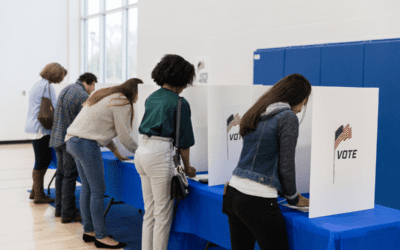
#image_title
A long-sought reform bill has finally become law, but small businesses, farmers, and veterans have been forced into more expensive alternatives that pose risks to their time-sensitive shipments.
When Tina Pohlman of La Crosse has to send important documents to a colleague in California, Sen. Ron Johnson isn’t far from her mind—and not in any kind of good way. She holds him responsible for supporting cuts and slowdowns at the US Postal Service (USPS) that have impacted her efforts to raise funds for medical research.
“He’s not looking out for small businesses like mine,” Pohlman said of Johnson. “He’s not looking out for smaller and mid-level businesses that are using the US Postal Service on a regular basis.”
Pohlman was aware of ongoing issues with the USPS, but she said they didn’t have a major impact on her until this year, as she was going about the annual state-by-state registrations necessary to fundraise for the APS Foundation of America, which she founded to raise awareness of Antiphospholipid Syndrome—an autoimmune disorder that causes multiple miscarriages, thrombosis, young strokes, and heart attacks.
While state governments are getting a little better at processing licenses and permits through standardized forms and online sites, Pohlman said it is still a major undertaking each May to submit paper forms and payments to many states in the short time period after the nonprofit group finishes its Internal Revenue Service paperwork.
The secretary for the foundation lives in California. In most years, Pohlman says, the annual rush to get registered across the country was predictable.
“I could trust the two-day envelope to make it there,” Pohlman said. “And she could put it in a two-day envelope and make it back. And we wouldn’t have to worry about anything. We could track it and there wouldn’t be a question.”
But in April the USPS announced a reduction in its “on-time” standards—allowing for up to five days for a first-class package to arrive, as more mail was being shipped by truck instead of air. For time-sensitive business matters, Pohlman said, they felt forced into more expensive private carriers.
“We would rather our money be going to awareness and research,” said Pohlman, a Lupus and Antiphospholipid Syndrome patient. “It’s hurting my nonprofit’s pocketbook, and it’s going to hurt research and awareness in my clients and the people that have Antiphospholipid Syndrome.”
The situation may be about to improve following passage of the Postal Service Reform Act, signed by President Joe Biden in April—designed to get the USPS out from under onerous burdens placed by Republicans 15 years ago and severe cuts instituted by Postmaster General Louis DeJoy, an appointee of former President Donald Trump. While Democratic Sen. Tammy Baldwin supported the long-sought measure, Johnson opposed it—and defended DeJoy for the cutbacks.
Johnson’s opposition to helping the Postal Service dates back more than a decade, when he opposed an attempt to help the Postal Service escape the red tape that he frequently criticizes in the private sector. A unique financial burden was added by congressional Republicans years earlier—forcing the USPS to pre-pay for the health costs of future retirees, a requirement put on no other federal agency.
In rejecting the pleas for help in 2012, Johnson said, “We simply cannot afford to add hundreds of billions more propping up a service that cannot survive on its own.”
By 2020, Johnson was acknowledging the problems and saying changes “should have been implemented years ago.” But rather than remove the artificial $50 billion liability, Johnson suggested rolling back overtime pay for carriers.
Back in rural Wisconsin, plenty of damage has already been done. Farmers who were used to using the post office to send everything from bees to baby chicks have had to use other carriers after thousands of small animals died in the delayed shipments. Veterans had to deal with delays in receiving their prescription medications. And Wisconsin small businesses that used to sing the praises of postal service reliability have switched to more expensive private carriers, which only exacerbates the USPS financial strain.
For Pohlman, Johnson’s actions don’t sit well.
“I was pretty disgusted that he voted no. I mean, he pays a lot of lip service to us, but he says one thing and then does another,” she said.
“I’m a businesswoman, and he’s not looking out for small businesses like mine.
Support Our Cause
Thank you for taking the time to read our work. Before you go, we hope you'll consider supporting our values-driven journalism, which has always strived to make clear what's really at stake for Wisconsinites and our future.
Since day one, our goal here at UpNorthNews has always been to empower people across the state with fact-based news and information. We believe that when people are armed with knowledge about what's happening in their local, state, and federal governments—including who is working on their behalf and who is actively trying to block efforts aimed at improving the daily lives of Wisconsin families—they will be inspired to become civically engaged.


Opinion: Many to thank in fair maps victory for Wisconsinites
On February 19, 2024, Governor Tony Evers signed into law new and fair state legislative maps, bringing hope for an end to over a decade of...

Opinion: Empowering educators: A call for negotiation rights in Wisconsin
This week marks “Public Schools Week,” highlighting the dedication of teachers, paras, custodians, secretaries and others who collaborate with...

Op-ed: Trump’s journey from hosting The Apprentice to being the biggest loser
Leading up to the 2016 election, Donald Trump crafted an image of himself as a successful businessman and a winner. But in reality, Trump has a long...

Not just abortion: IVF ruling next phase in the right’s war on reproductive freedom
Nearly two years after the US Supreme Court overturned Roe v. Wade, another court is using that ruling to go after one of the anti-abortion right’s...





